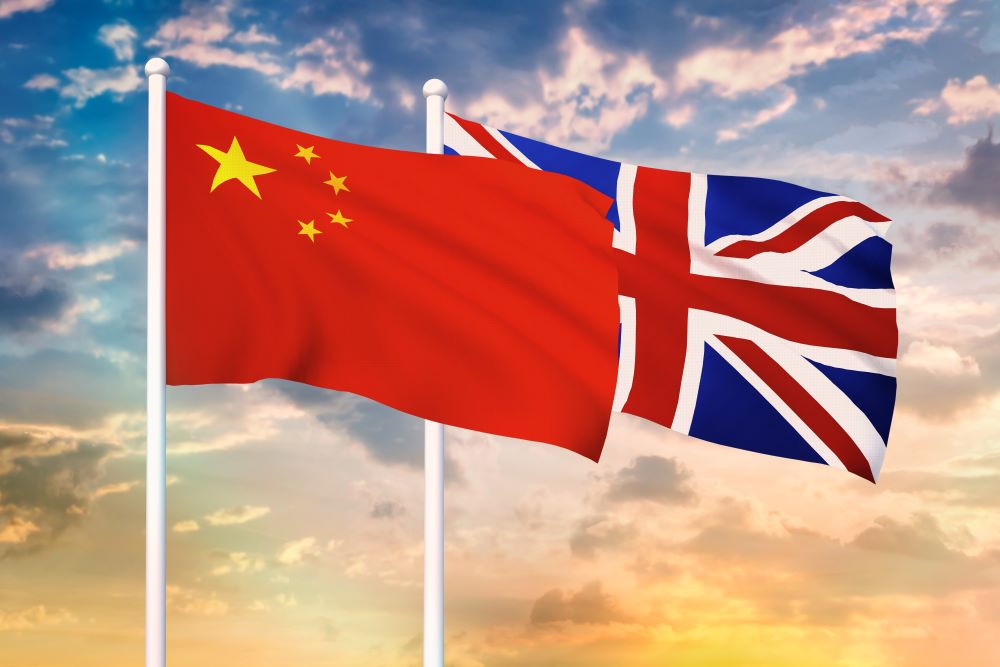
The government has been surveying British businesses about their investments into China amid speculation that the UK could follow the US in imposing new restrictions.
President Joe Biden earlier this month signed an executive order banning US investment in “foreign countries of concern” in technologies of importance to national security.
The FT reported at the time that Rishi Sunak was consulting with businesses to decide the UK’s response to this and Politico has today (21 August) reported that it has obtained documents relating to a government survey asking British firms about their investments in “sensitive” Chinese sectors.
‘Sensitive sectors’
The survey was conducted in late July and was “designed to build a collective understanding” of investment in “sensitive sectors” including robotics, advanced manufacturing, transport, energy and communications.
The government said the survey was a “first step” and it sought to gauge UK investment in a range of other countries – as well as China – including Australia, Mexico and the US.
Balancing act
Hamish Mackay, a trade and customs specialist at the Institute of Export & International Trade, told the Daily Update that government had a difficult balancing act to make when deciding how to approach its trading relationship with China.
“China is a massive market so you want to have access to it. Indeed it’s the second largest economy in the world and one of the largest investors in the UK,” he said.
“But the government has to balance international trade with national security. Many businesses in China are state-owned and there is a lack of transparency in how they operate, which makes them a risk in terms of security.
“You also have the government wanting to maintain relations with the US, which has taken a more protectionist approach in recent years. The UK doesn’t necessarily have to go down this route, but these are difficult decisions that government is faced with, and national security will always trump trade.”
Hard choices
Ross Nugent, a senior associate at Global Counsel, told Politico that new investment rules would force businesses involved in China to make “hard choices”.
In a survey conducted by the British Chamber of Commerce in China earlier this year, a majority of respondents said they were adopting a “wait and see approach” to future business dealings with China.
Mackay notes that businesses are faced with a similar predicament to government in that it’s the lack of transparency in many Chinese businesses that makes them a risk to do business with.
“Many businesses there are state-owned and the lack of transparency which comes with this makes them risky to deal with,” he said, adding that British businesses need to stay updated on embargoes and controls on military and dual-use items introduced by government.
Alignment
The US restrictions on investments are currently going through a period of consultation but, if implemented, they will impact the following types of goods: semiconductors and microelectronics, quantum information technologies and artificial intelligence
Following the signing of the Atlantic Declaration earlier this year, the UK has promised to align more closely on policy areas including security, technology and export controls.
BRICS
The rumours of UK restrictions on investment in China come amid reports that Beijing is looking to push the BRICS group of emerging markets into becoming a fully-fledged rival to the G7.
South Africa – one of the BRICS markets – is hosting leaders from over 60 developing countries at a summit this week, and the FT is reporting that that a debate is brewing over whether the bloc should become a non-aligned economic group or a political unit that can challenge the West.
“If we expand BRICS to account for a similar portion of world GDP as the G7, then our collective voice in the world will grow stronger,” a Chinese official told the FT.
BRICS was formed when South Africa joined the previously-named BRIC group in 2010, with Brazil, Russia, India and China being the other members. The previous BRIC acronym was coined by economist Jim O’Neill in 2001.
Tensions
US-China tensions have escalated in recent years and the UK has increasingly sought to follow Washington’s lead in cooling its own relations.
However, this has continually been a debating point within the Conservative party, with hawkish MPs calling for the UK to adopt a hard line approach, but foreign secretary James Cleverley recently saying a more constructive attitude was needed.
Indeed the Times has today reported that the Foreign, Commonwealth and Development Office (FCDO) has told civil servants to avoid calling China a “hostile state”.
Former cabinet minister Sir Iain Duncan Smith told the paper that this was “pathetic”.
“The idea that China is not a hostile state is absurd,” he said.
